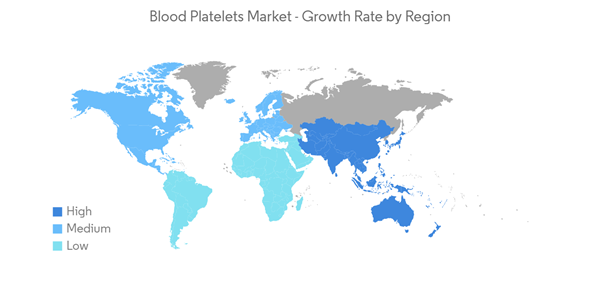The COVID-19 pandemic was an unprecedented health concern that impacted the blood platelets market. During the COVID-19 epidemic, there was an international shortage of blood donors since most donors were afraid of contracting the infection. For instance, according to the American Red Cross in January 2022, since the start of the pandemic, the Red Cross has seen a 10% drop in the number of people donating blood, and the organization has dealt with pandemic-related concerns such as ongoing blood drives cancellations and personnel shortages. The increase in COVID-19 cases adds to the concern. The Red Cross had seen low donor turnout during the pandemic. Thus, a decline in blood donation and the cancellation of blood donation drives during the pandemic severely impacted the market growth during the COVID era. Nevertheless, since the limits were removed, the sector has been recovering strongly. The market recovery over the following years has been driven by an increase in blood donation drives and a decline in COVID-19 infection apprehension.
Market growth can be largely attributed to factors such as the increasing prevalence of chronic blood-related disorders and the rising number of surgical procedures. These factors have created significant demand for blood platelets over the years and may continue to do so in the future.
With the increasing prevalence of chronic blood-related disorders, such as myelofibrosis, leukemia, hemophilia, and thrombocytopenia, there is an increased demand for blood platelets. According to the World Federation of Hemophilia’s October 2021 report, owing to the sex linkage of the disorder, there is a higher prevalence of hemophilia in males than in females. Hemophilia occurs worldwide and across all racial groups. According to the World Federation of Hemophilia global report published in October 2021, there were 209,614 people diagnosed with hemophilia. These included 165,379 Hemophilia A patients, 33,076 Hemophilia B patients, and 11,159 Hemophilia type unknown patients. Such a huge prevalence of hemophilia will lead to increased adoption of therapies for hemophilia, driving the market growth. Leukemia affects a considerable proportion of the world's population.
According to GLOBOCAN 2020 statistics, leukemia accounted for 474,519 cases for both sexes and all ages globally in 2020. Furthermore, according to the Leukemia & Lymphoma Society's 2021 statistics, an estimated 397,501 persons in the United States are living with or in remission from leukemia. As a result, overall statistics show that many people are at risk of developing leukemia, which may directly impact market growth during the projection period.
The increasing number of surgical procedures worldwide contributes to the increasing demand for blood platelets. Similarly, an increase in the number of orthopedic and cardiac surgeries contributes to the rising demand for blood platelets in hospitals. Additionally, an increase in organ transplantations has boosted the demand for blood platelets. As per the data published by the Health Resources and Services Administration in March 2022, about 40,000 organ transplants were performed in the United States in 2021. In addition, 26,670 kidney transplants and 9,236 liver transplants were performed in the United States in 2021. Moreover, an increase in the number of trauma surgeries due to impact forces, such as accidents, falls, sports, and crush injuries, is projected to boost the demand for blood platelets in the coming years. For instance, according to 2021 statistics by the World Health Organization, 20-50 million people suffer from non-fatal road injuries each year. Such a huge number indicates these populations' rising need for blood platelets.
Thus, all the above-mentioned factors are currently augmenting the growth of the blood platelets market. However, the shortage of blood donors, the risk of infections, and the high cost of surgeries are a few factors that restrain the market growth.
Blood Platelets Market Trends
Platelet Function Disorders Segment is Expected to Witness a Significant CAGR During the Forecast Period
Based on applications, platelet function disorders are predicted to witness significant growth. The major factors owing to the growth of the segment are the increasing prevalence of cancer. Chronic myelogenous leukemia and multiple myeloma cancers lead to the development of acquired platelet function disorders in some cancer patients. Therefore, cancer patients must undergo platelet transfusions frequently. For instance, the American Cancer Society predicted in 2022 that approximately 34,470 people were likely to be diagnosed with multiple myeloma in the United States. Such numbers indicate the rising demand for platelet transfusions in the treatment of cancer patients. Moreover, chronic platelet function disorders contribute to the increasing demand for platelet transfusions. Thus, the administration of platelets in such patients is frequently performed to mitigate complications, including RBC requirements, surgical blood loss, and reoperation for bleeding.Growing R&D activity by research institutes is also expected to support market growth. For instance, in March 2021, Dr. Bethan Psaila, Group Leader at the Medical Research Council Molecular Haematology Unit (MRC MHU) and principal investigator at the Radcliffe Department of Medicine at Oxford University and Cancer Research UK (CRUK) Advanced Clinician Scientist looked into the possibility of circulating blood platelets for early diagnosis of various cancer types. Thus, such R&D activity is expected to bring advanced blood platelet products into the market, and it is likely to support the growth of the segment during the forecast period.
Thus, due to the above-mentioned factors, the segment is anticipated to grow significantly during the forecast period.
North America is Expected to Hold a Significant Share in the Market and Expected to do Same Over the Forecast Period.
North America is expected to show a similar trend during the forecast period without significant fluctuations. This is largely due to the presence of several organizations engaged in the distribution of blood components. Moreover, the organizations in the region are engaged in increasing awareness regarding the importance of blood donation, which is increasing the number of blood donors in the region. For instance, according to the American Red Cross in January 2022, an estimated 6.8 million people in the United States donate blood each year. In the United States, 13.6 million units of whole blood and red blood cells are collected each year.Additionally, the number of platelet transfusions in the region has boosted the demand for blood platelets. For instance, as per January 2022 statistics by The American National Red Cross, approximately 16 million blood components are transfused each year in the United States. Thus, due to the above-mentioned factors, the blood platelets market is anticipated to grow significantly during the forecast period in North America. Moreover, the growing prevalence of blood-related diseases is expected to boost market growth. According to the World Federation of Hemophilia 2021 report, there were 14,816 patients with hemophilia in the United States in 2020, including (Hemophilia A -11,790 and Hemophilia B-3,026) and people diagnosed with hemophilia in the United States, and 3,924 patients with hemophilia in Canada in 2020, including Hemophilia A -3,223 and Hemophilia B-701. Thus, the increasing prevalence of hemophilia is likely to support the growth of the market.
In addition, strategic activity by the key market players is expected to boost market growth. For instance, in May 2021, Canadian Blood Services entered a contract with Cercus Corporation for the INTERCEPT Blood System for platelets.
Thus, all the aforementioned factors are expected to boost the market in the region.
Blood Platelets Market Competitor Analysis
The blood platelets market is moderately competitive, and a few companies currently dominate the market. These companies include Blood Centers of America, the American National Red Cross, Canadian Blood Services, Cellphire Inc., and PlateletBio, among others. The competition in the market is majorly based on the provision of blood components by these companies. Additionally, key players have been involved in organizing blood donation drives, campaigns, and blood supply services to meet the demand from ambulatory surgical centers and hospitals. In order to secure its position in the global market, the focus has been on expanding the collection of blood platelets.Additional benefits of purchasing the report:
- The market estimate (ME) sheet in Excel format
- 3 months of analyst support
This product will be delivered within 2 business days.
Table of Contents
Companies Mentioned (Partial List)
A selection of companies mentioned in this report includes, but is not limited to:
- America's Blood Centers
- Blood Centers of America
- American Association of Blood Banks (AABB)
- American National Red Cross
- Canadian Blood Services
- The European Blood Alliance
- OneBlood
- Blood Bank of Alaska
- Australian Red Cross
- Brazilian Red Cross
- French Red Cross
- Indian Red Cross Society










